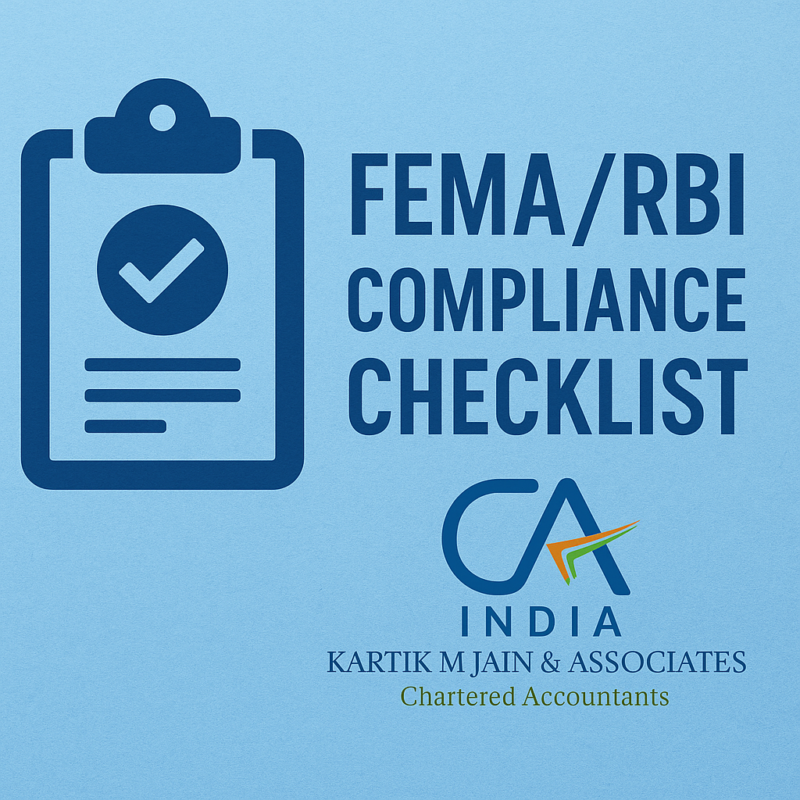In today’s global business environment, international transactions are no longer limited to large corporations. From startups receiving foreign investment to SMEs engaging in overseas trade, many Indian businesses are now part of the global financial ecosystem. With this global exposure comes the responsibility of complying with FEMA (Foreign Exchange Management Act) and the regulatory framework laid down by the Reserve Bank of India (RBI).
Failure to meet these compliance obligations can result in significant penalties, reputational risks, and even restrictions on future foreign dealings. Whether you’re a startup founder, a CFO, or a business owner, understanding your FEMA/RBI obligations is essential for smooth and lawful international operations.
Here’s a clear and concise compliance checklist for 2025 to help you stay ahead.
 What is FEMA Compliance?
What is FEMA Compliance?
FEMA, 1999 is India’s primary legislation governing all foreign exchange transactions. Its objective is to facilitate external trade and payments and maintain the foreign exchange market in India. The Reserve Bank of India (RBI) regulates these transactions through notifications and circulars, which businesses must adhere to.
If your company has received foreign investment, borrowed from abroad, or invested in overseas entities, you are subject to FEMA regulations. Non-compliance can attract penal action under FEMA, which may include fines up to three times the sum involved.
 FEMA/RBI Compliance Checklist for 2025
FEMA/RBI Compliance Checklist for 2025
1. FLA Return – Foreign Liabilities and Assets
-
Who needs to file? Any Indian company that has received FDI or made ODI.
-
Due Date: July 15, 2025
-
Why it matters: This annual return captures your company’s foreign assets and liabilities as of March 31.
Note: Even if there’s no outstanding foreign investment at the end of the financial year, filing is mandatory if there was any inflow or outflow during the year.
2. APR – Annual Performance Report
-
Who needs to file? Indian entities or residents with joint ventures or wholly-owned subsidiaries outside India.
-
Due Date: December 31, 2025
-
Purpose: To report the performance and financials of your foreign entity to RBI via your bank.
3. ECB Reporting
-
Who needs to file? Businesses that have availed of External Commercial Borrowings (foreign loans).
-
Form: ECB-2 Return
-
Due Date: Within 7 working days of each month’s end
-
Why it matters: This is a monthly requirement and must be diligently reported.
4. Single Master Form (SMF) Reporting
RBI has consolidated various reporting requirements into a single portal. If your business has foreign investment, you may need to file any of the following under SMF:
-
FC-GPR: For issue of shares to a foreign investor (within 30 days of allotment)
-
FC-TRS: For transfer of shares between resident and non-resident (within 60 days)
-
LLP-I & LLP-II: For capital contributions in LLPs and subsequent transfers
-
Form CN: For Convertible Notes (within 30 days of issue or transfer)
-
Form DI: For downstream investments
-
Form InVi: For investments by investment vehicles
5. Advance Reporting Form (ARF)
-
Who needs to file? Companies receiving FDI.
-
Due Date: Within 30 days from the date of receiving funds.
-
Why it matters: This must be filed even before issuing any shares to the foreign investor.
 Common Pitfalls to Avoid
Common Pitfalls to Avoid
-
Late Filing: Every form mentioned has a strict deadline. Missing these can attract fines or delay future transactions.
-
Incorrect Reporting: Errors in foreign asset valuation, share pricing, or reporting ownership structure can trigger scrutiny.
-
Ignoring Historical Transactions: Even if a foreign investment happened years ago, you may still have reporting obligations.
 Why Timely FEMA Compliance Matters
Why Timely FEMA Compliance Matters
-
Avoid Penalties: FEMA violations can lead to penalties of up to 300% of the amount involved.
-
Reputation Risk: Non-compliance reflects poorly during funding rounds, audits, and due diligence.
-
Ease of Operations: Timely compliance ensures faster approvals for future investments or remittances.
 How We Can Help
How We Can Help
At Kartik M Jain & Associates, Chartered Accountants, we specialize in helping Indian businesses navigate FEMA and RBI compliance with ease. Whether you are:
-
Raising foreign capital,
-
Investing abroad, or
-
Reporting existing transactions,
We ensure your business remains compliant, protected, and future-ready.
 Final Thoughts
Final Thoughts
FEMA and RBI compliance is not just a legal obligation—it’s a business imperative. With deadlines spread throughout the year and evolving regulations, it’s easy to overlook key filings. Use this checklist to stay organized, avoid penalties, and focus on growing your business globally.
Kartik M Jain and Associates,Chartered Accountants is a practicing CA in Pune is a professionally managed firm serving domestic and international clients providing services relating to direct and international taxation, indirect taxation, auditing and assurance and Consultancy. With a team of expert and experienced Professionals, The firm aims to provide quality and effective services. The firm provides complete end to end solutions to your complete business needs under one roof.
Our Services :- GST consultation, Chartered accountant, Income Tax consultancy, Corporate law, International Taxation, Transfer Pricing, Regulatory & Advisory Services.


